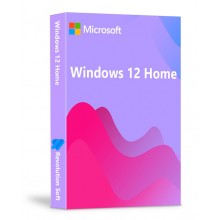Despite Windows 11 not having celebrated its second anniversary yet, we already have the first information about the operatingsystem that will succeed it. Microsoft is already working on Windows 12, so let's tell you about the main expected features, details about its future release, and everything you need to know about this major redesign.
Features and Innovations of Windows 12

According to Windows Central, Windows 12 will be a highly modular version. Its main objective will be to become a system adapted to a wide variety of devices with different shapes and sizes. Windows will be rebuilt from scratch, incorporating only what is essential. Additionally, they aim for Windows 12 to be optimized for specific chips. They are working on a "silicon-optimized" version, fully adapted to the SoCs used in PCs. This approach is similar to what Apple has been doing for some time with its Apple Silicon, to achieve better synergy between hardware and software.
Another major innovation will come with the "state separation" (CoreOS). It involves a series of partitions that will not be accessible to the user. The purpose of this division is to enable faster updates, improved factory reset, and a more compartmentalized and secure system. There is also expected to be a greater presence of Artificial Intelligence, with the integration of ChatGPT in Bing, increased presence in Edge, and throughout the entire operating system.
In terms of design, changes related to the taskbar are anticipated, with it becoming floating (similar to what we see in macOS). Likewise, there may be changes in the system icons and their placement.
In addition to this, it is expected that Microsoft will continue to strengthen its commitment to its own services such as Your Phone (for connecting Android devices). In summary, Windows 12 will be a more modular, efficient version with some design changes that will redefine the current lines.
Windows 12 Release Date: When Will Windows 12 Be Released?

It is still early to know the official release date of Windows 12. However, considering that Windows 11 was released in October 2021 and Microsoft's new update cycle has been set at three years, we expect Windows 12 to be available from the last quarter of 2024. October is the most rumored month, but there is no official confirmation yet.
What Will Be the Minimum Requirements for Windows 12?

It is expected that, at a minimum, the requirements for Windows 12 will follow the same line as the previous version. Since a significant change in the system is anticipated, there may be an increase in certain points related to the CPU and other PC components. However, we will not know these details until the official presentation.
- 64-bit processor (ARM/x86) running at a minimum of 1GHz
- 4 GB of RAM
- Minimum of 64 GB of storage
- UEFI firmware with Secure Boot support
- TPM 2.0 (Trusted Platform Module)
- Minimum 9-inch screen with a resolution of 1,366 x 768 pixels
- DirectX 12 compatible GPU
- Internet connection
Will I Be Able to Upgrade to Windows 12?

Presumably, we will be able to upgrade to Windows 12, if there are no significant changes in the system, through Windows Update. When the update is available for our device, we will receive a notification through which we can officially upgrade to the new version.
Likewise, it is expected that it will still be possible to perform a completely manual installation if we want to install the operating system in a cleaner way from an external drive.
What Will Be the Price of Windows 12?
Unless something unexpected happens, Windows 12 will be a completely free upgrade for those who have an active license of Windows 11. Simply updating from Windows 11 to 12 will provide a renewed and valid license for the next version of the operating system.
Therefore, a great option to get Windows 12 at the best price is to obtain a cheap official license for Windows 11. You can purchase it for just €21.17.
What Will the Upgrade Process to Windows 12 Be Like?

According to circulating rumors, it is speculated that Windows 12 will be a free and non-mandatory upgrade, similar to what happened with Windows 11. It should be noted that claiming it is completely free might be somewhat inaccurate, as you are supposed to have a previous version of Windows, and it is still unclear whether only Windows 11 will be eligible or if Windows 10 will also be accepted. However, the crucial point is that, given Microsoft's current trend, you should not have to pay for this upgrade if you already have a genuine Windows 11 license.
Regarding the obligation to upgrade, let's remember what happened with Windows 10 and Windows 11. You may have encountered multiple messages encouraging you to upgrade, but if you choose to ignore them, you can continue using Windows 10 without any issues. Microsoft is expected to provide technical support and release updates until October 14, 2025. As for Windows 11, it does not yet have an "expiration date."
What is certain is that until 2024, more rumors, speculations, and possibly some concrete information about Windows 12 will emerge. This is especially true because Microsoft has already announced to Windows developers and testers the launch of their own test update channel.









